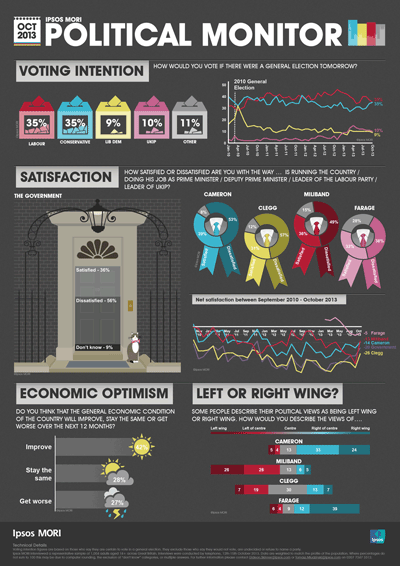Public sees both Miliband and Cameron drifting further to the left and right
Public sees both Miliband and Cameron drifting further to the left and right
All leaders see a boost in their satisfaction ratings
CON 35 (+1); LAB 35 (-2); LIB DEM 9 (-1); UKIP 10 (-1)
Ipsos’s latest poll has Labour and the Conservatives tied for the first time since January 2012, though the movement from last month’s poll is not statistically significant. Both parties are on 35% among those who say they are certain to vote, UKIP is on 10% and the Liberal Democrats on 9%.
This first Ipsos poll after the conference season has seen all the leaders enjoy a bump in their personal ratings, with Ed Miliband’s ratings seeing the biggest rise since September both among the general public and his own supporters. Six in ten (61%) Labour supporters are now satisfied with the way Ed Miliband is performing as Labour leader, this is the highest Ipsos has recorded since his first month in office.
 (Click or Tap image to enlarge)
(Click or Tap image to enlarge)
The public are also less likely to say they don’t know what Ed Miliband stands for than they were before Conference season. 45% say they don’t know what Mr Miliband stands for, down from 51% in August. The other leaders have seen little or no change since August with 53% saying they don’t know what Nick Clegg stands for (up 3 points) while 36% say the same about Nigel Farage (-1) and 34% for David Cameron (+1).
- 36% of British adults are satisfied with the way Mr Miliband is doing his job while 49% are dissatisfied (improving from 24% and 60% in September). His net rating (% satisfied minus % dissatisfied) is -13. Mr Miliband’s net rating among Labour supporters is +34 (61% satisfied, 27% dissatisfied).
- Four in ten (39%) people are satisfied with Mr Cameron’s job performance while 53% are dissatisfied (improving from 36% and 56% respectively last month), giving him a net rating of -14. Among Conservative supporters 80% are satisfied with the Prime Minister, 14% dissatisfied (net rating of +66).
- 31% are satisfied and 57% dissatisfied with Nick Clegg’s performance as Deputy Prime Minister, improving from 24% and 64% respectively last month. He has a net rating of +25 among Liberal Democrat supporters (56% satisfied, 31% dissatisfied).
- Nigel Farage has a net rating of -5, with 33% satisfied and 38% dissatisfied, though 28% still say they don’t know, in September 29% were satisfied and 36% dissatisfied. Nine in ten (90%) UKIP supporters are satisfied with their leader.
As many people think David Cameron is either “right wing” or “right of centre” (57%) as think Ed Miliband is “left wing” or “left of centre” (54%). These figures represent an increase of 8 points for Mr Cameron and 10 points for Mr Miliband since October 2010. Mr Clegg is mostly seen as being in the centre (30%), while 26% believe he is either left of centre or left wing, and 20% say he is either right of centre or right wing. Four in ten (39%) people see Nigel Farage as right wing, and 12% say he is right of centre (51% on the right in total).
Of the main policies announced across the three party conferences, Ed Miliband’s proposal to freeze gas and electricity prices for 20 months is the most popular with 62% saying it is the best for them personally and 50% seeing as the best for the country.
- George Osborne’s freeze on petrol duty for 18 months was the second most popular with 56% saying it is best for them, and 44% best for the country.
- Nick Clegg’s plan to raise the tax-free earnings threshold for people on the minimum wage came third, with 40% saying it would be good for them, and 44% good for the country.
- Three in ten (29%) people say the Liberal Democrat promise of free school meals for all children aged under eight would be best for them personally, rising to four in ten (41%) who say it would be best for the country
- Less popular were the Conservatives’ plans to help homebuyers with mortgage deposits (23% saying best for them and 33% best for the country) and Labour’s policy of offering 25 hours of free childcare per week (22% best for them and 33% best for the country)
Four in ten (42%) believe the economy will improve in the next 12 months while 27% think it will get worse. This gives an Economic Optimism Index score of +15 (% saying improve minus % saying get worse) which is down slightly from September but still solidly positive.
Gideon Skinner, Head of Political Research at Ipsos said:
“The dividing lines between the leaders are a bit clearer after conference season, and they have all shored up their support – especially Ed Miliband, who has given more confidence to his own supporters. At the same time we have seen the Conservatives’ vote share rise in recent months in line with economic optimism. The public’s view is fascinatingly poised.”
- Download topline results (PDF)
- Download the charts (PDF)
- Download the full computer tables (PDF)
- Download the infographic (PDF)
Technical Note
Ipsos interviewed a representative sample of 1,004 adults aged 18+ across Great Britain. Interviews were conducted by telephone 12th – 15th October 2013. Data are weighted to match the profile of the population.



